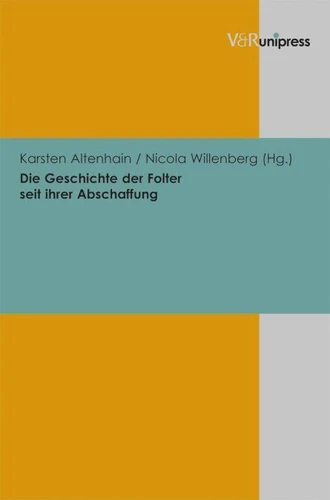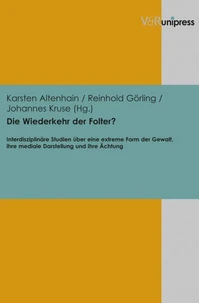Die Geschichte der Folter seit ihrer Abschaffung
Par : ,Formats :
Disponible dans votre compte client Decitre ou Furet du Nord dès validation de votre commande. Le format PDF est :
- Compatible avec une lecture sur My Vivlio (smartphone, tablette, ordinateur)
- Compatible avec une lecture sur liseuses Vivlio
- Pour les liseuses autres que Vivlio, vous devez utiliser le logiciel Adobe Digital Edition. Non compatible avec la lecture sur les liseuses Kindle, Remarkable et Sony
 , qui est-ce ?
, qui est-ce ?Notre partenaire de plateforme de lecture numérique où vous retrouverez l'ensemble de vos ebooks gratuitement
Pour en savoir plus sur nos ebooks, consultez notre aide en ligne ici
- Nombre de pages212
- FormatPDF
- ISBN978-3-86234-863-3
- EAN9783862348633
- Date de parution17/08/2011
- Protection num.pas de protection
- Taille1 Mo
- Infos supplémentairespdf
- ÉditeurV&R Unipress
Résumé
The conditions under which torture might be allowed have been the subject of recent discussion particularly in the light of so-called "rescue torture". The fact that the abolition of torture was always seen as a milestone on the way to the rule of law and the constitutional state and a central element of the self-conception of western legal systems at least, seems to have been forgotten. The contributions to this volume analyse on the one hand the increasingly proclaimed abolition of torture in the 18th century, and on the other the various forms and functions of torture that nevertheless continued.
The central focus lies on punishments for disobedience in the 18th and 19th centuries including the torture crimes perpetrated by police and military forces not only in the colonies, but also the accusation by the German Red Army Faction of the use of torture. How has the function of torture changed and how does this change relate to the changed view of humanity and the proclaimed proscription of torture? Was there a discourse after its official abolition on torture and physical or mental violence in the context of criminal proceedings? The aim of the volume is to demonstrate under what conditions and in what forms torture has always been able to reassert itself - even in the emergent constitutional state.
The central focus lies on punishments for disobedience in the 18th and 19th centuries including the torture crimes perpetrated by police and military forces not only in the colonies, but also the accusation by the German Red Army Faction of the use of torture. How has the function of torture changed and how does this change relate to the changed view of humanity and the proclaimed proscription of torture? Was there a discourse after its official abolition on torture and physical or mental violence in the context of criminal proceedings? The aim of the volume is to demonstrate under what conditions and in what forms torture has always been able to reassert itself - even in the emergent constitutional state.
The conditions under which torture might be allowed have been the subject of recent discussion particularly in the light of so-called "rescue torture". The fact that the abolition of torture was always seen as a milestone on the way to the rule of law and the constitutional state and a central element of the self-conception of western legal systems at least, seems to have been forgotten. The contributions to this volume analyse on the one hand the increasingly proclaimed abolition of torture in the 18th century, and on the other the various forms and functions of torture that nevertheless continued.
The central focus lies on punishments for disobedience in the 18th and 19th centuries including the torture crimes perpetrated by police and military forces not only in the colonies, but also the accusation by the German Red Army Faction of the use of torture. How has the function of torture changed and how does this change relate to the changed view of humanity and the proclaimed proscription of torture? Was there a discourse after its official abolition on torture and physical or mental violence in the context of criminal proceedings? The aim of the volume is to demonstrate under what conditions and in what forms torture has always been able to reassert itself - even in the emergent constitutional state.
The central focus lies on punishments for disobedience in the 18th and 19th centuries including the torture crimes perpetrated by police and military forces not only in the colonies, but also the accusation by the German Red Army Faction of the use of torture. How has the function of torture changed and how does this change relate to the changed view of humanity and the proclaimed proscription of torture? Was there a discourse after its official abolition on torture and physical or mental violence in the context of criminal proceedings? The aim of the volume is to demonstrate under what conditions and in what forms torture has always been able to reassert itself - even in the emergent constitutional state.




